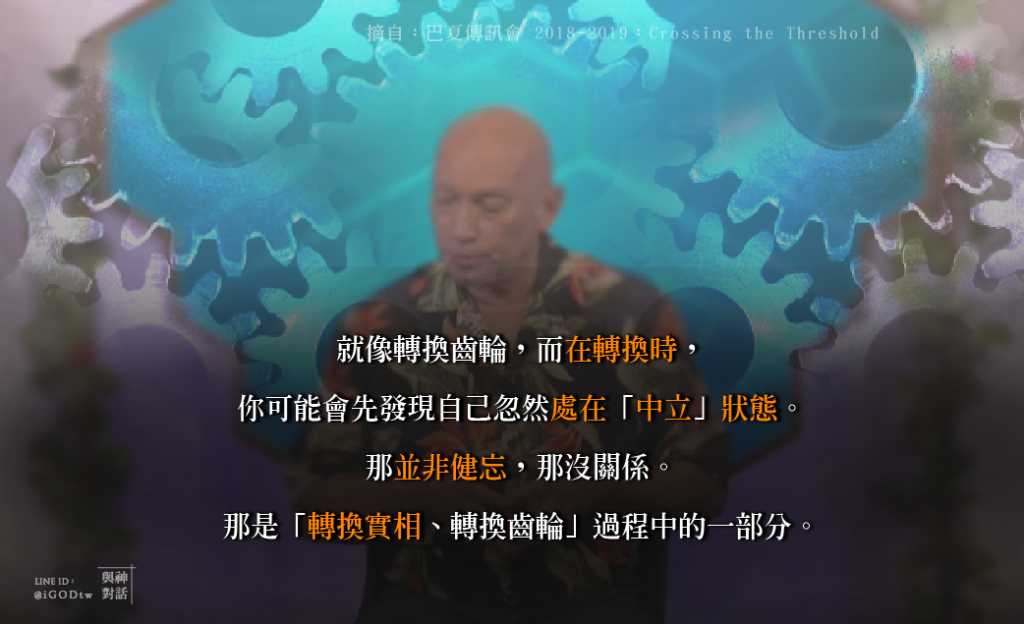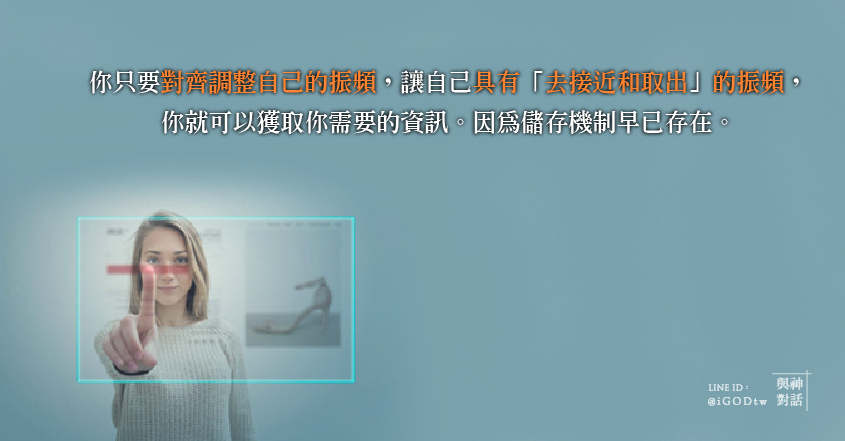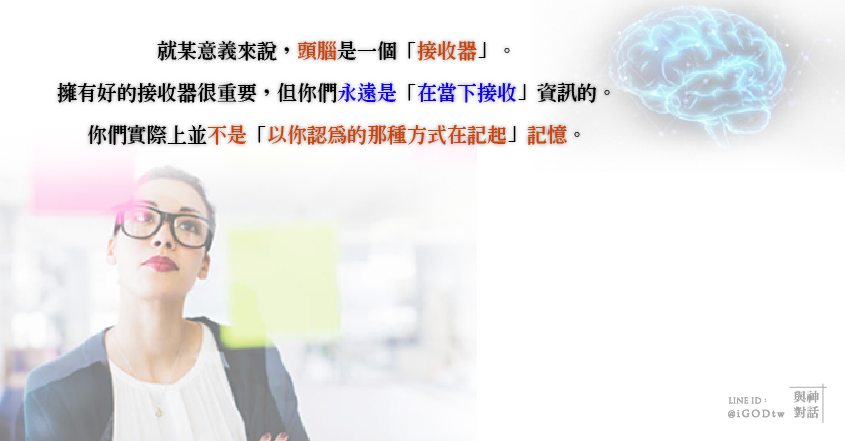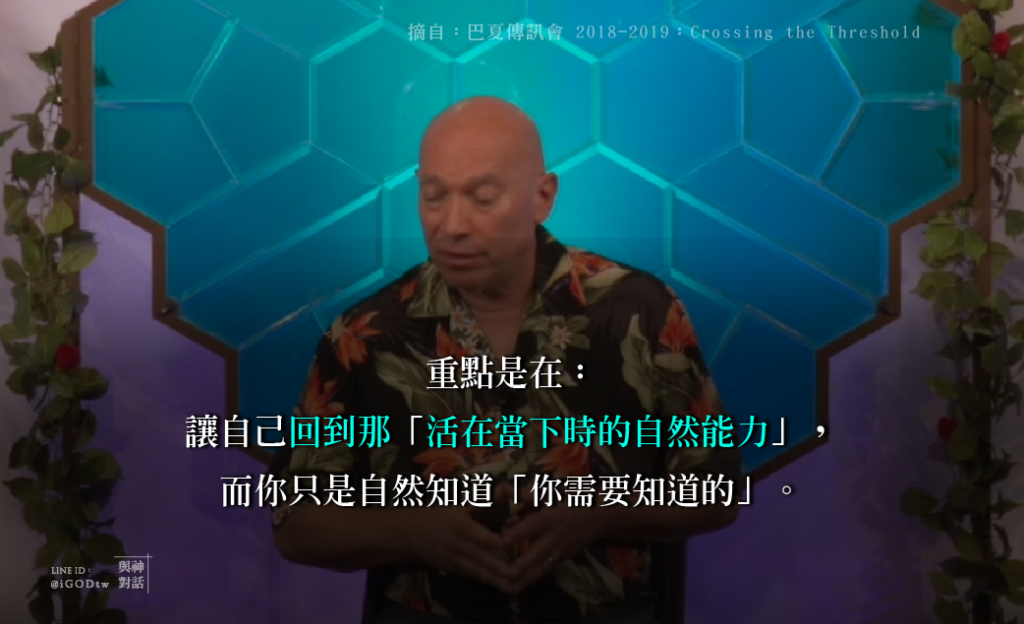【頭腦「進入和接收」記憶,而非「儲存」記憶】
巴夏精選短片(9分45秒)【頭腦「進入和接收」記憶,而非「儲存」記憶】Bashar313
影片摘自:2018-2019:Crossing the Threshold
購買網址:http://www.basharstore.com/2019-crossing-the-threshold/
中文翻譯:Jimmy
【頭腦「進入和接收」記憶,而非「儲存」記憶】
Brain does not store memory but access to receive information you need.
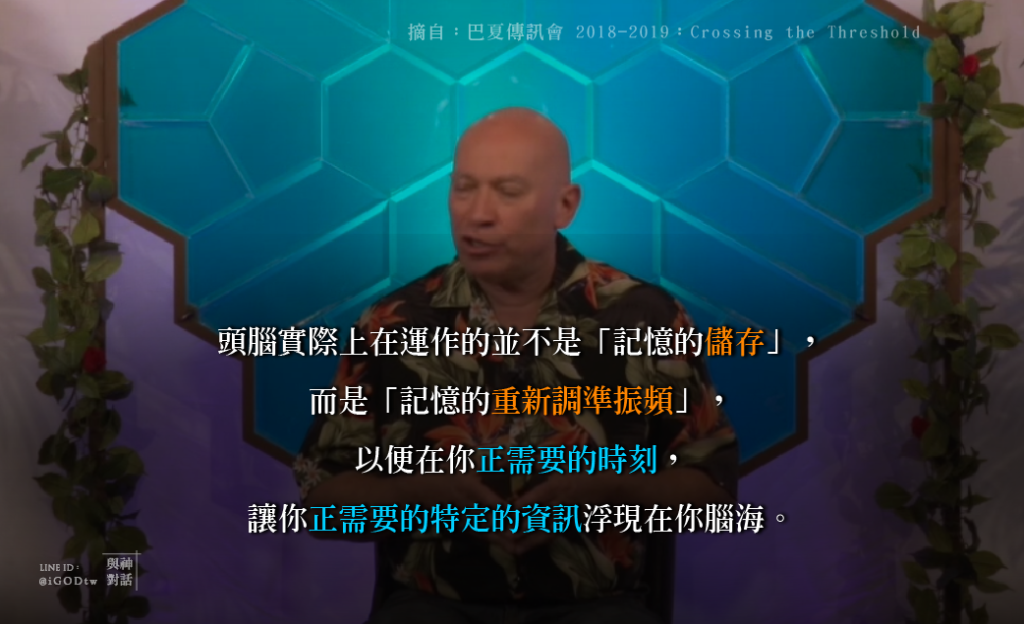

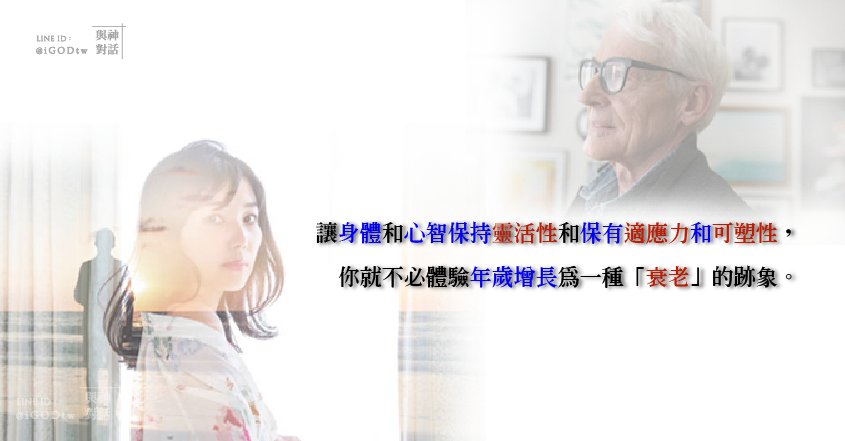
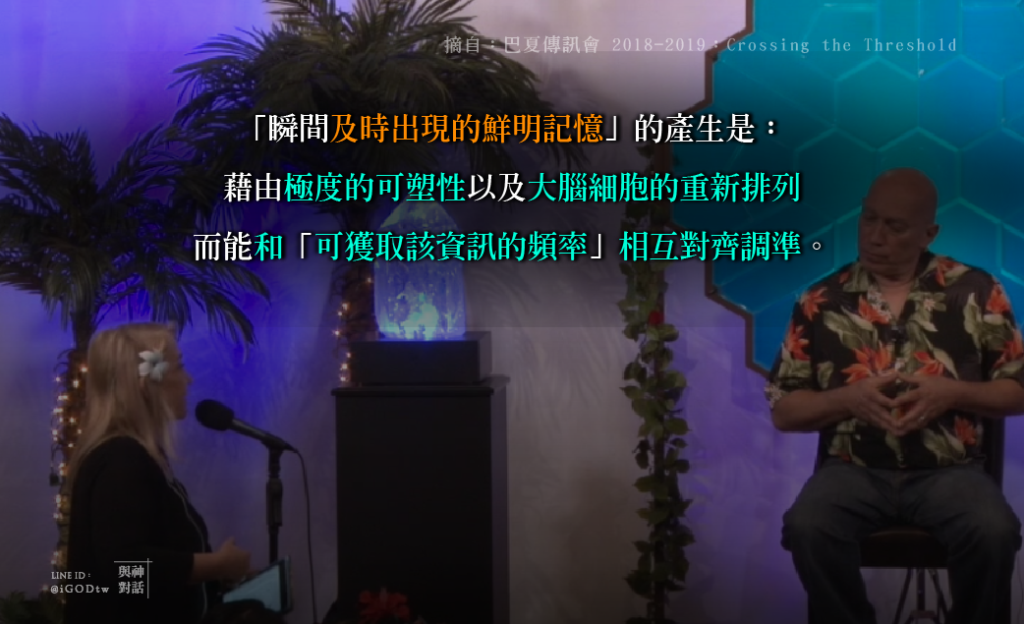
How can we function in this reality without memory?
若是沒有「記憶」這東西的話,我們在這實相中的生活如何運作?
You won’t be functioning in this reality. You will be functioning in another one in which you don’t need to have it in the same way you do in the other reality.
在這實相中你們會無法運作。你們要在進入另一種實相中才能以「不需要記憶的方式」運作。
Q: Do you tell…?
Q: 你的意思是說?
You will be functioning in a different reality.
你們將在一種「不同的實相」(將自己轉換至不同的實相)中才能夠不需要記憶。
Q: Okay. But…
Q: 好的。但是…
Yes?
是的?
Q: Well, most of us…
Q: 嗯,我們大部分的人…
Yes?
是的?
Q: I will start with that…
Q: 我這樣開始說好了…
Q: Most of us experience a relatively consistent reality where everybody needs to be able to remember things, so that they can function well, and…
Q: 我們大部分的人都體驗著一種「前後相當一致」(時間是線性)的實相,在這樣的實相中大家都需要「能夠記得」事物,才能讓(自己的)生活運作良好…
Yes. But that’s that reality.
沒錯,但那只是「那樣」的一種實相。(實相有非常多種。)
Q: And maybe part of the transition of this reality is that you can find yourself not being able to remember words, or…
Q: 而或許「會發現自己不記得一些話語」是轉換(離開目前)這實相的一部分,或者…
Sometimes that happens in transitions, yes.
在轉換實相的過程中,有些時候會發生那樣的情況,沒錯。
You need to change gears and changing gears you might suddenly find yourself in neutral first.
(就像)你需要轉換齒輪,而在轉換齒輪時,你可能會先發現自己忽然處在「中立」狀態(那不是健忘)。
That’s fine. It’s part of the process.
那沒關係。那是(轉換實相、轉換齒輪)過程中的一部分。
Q: Okay. So, in this reality, it’s the…
Q: 好的。所以,在這實相中,那是…
Which one?
哪一個實相?
Q: Okay. The one that at least I’m used to.
Q: 好的,在這個我至少已習慣的實相。
Yes.
好。
Q: People who have really good memories are rewarded for that often.
Q:記憶力非常好的人們通常會因為記憶好而受到獎勵。
Yes.
沒錯。
Q: And it seems to be a sign of being smart, and often I mean, like if you’re a doctor or veterinarian and you can pass those exams where you know all those words that seems really challenging.
Q: 而這被視為一種聰明的象徵,我的意思是,如果你是一名醫生或獸醫,你可以通過那些考試,因為你知道所有那些真的很有挑戰的字詞的意思。
Yes…If you say so.
是的…如果你這樣說的話。
Q: And then people who are in physics, it’s like having a really good brain. Seems to go along hand-in-hand with having the ability to remember things.
Q: 而在物理科技領域工作的人,腦袋好像特別好。他們似乎擁有能記住許多東西的記憶力。
In a sense, because your brain is a receiver, yes?
就某意義上來說,因為你們的頭腦是一個「接收器」,不是嗎?
But, the idea again, is still memory is created in the moment.
但是,我要再次強調,這概念是:記憶是在「當下」創造的。
So, yes, it’s important to have a good receiver but you’re still receiving the information in the now.
所以,沒錯,擁有好的接收器很重要,但你們仍然是(永遠是)「在當下接收」資訊的(接收「你想用頭腦想出或記起」的資訊)。
You’re not actually remembering in the sense of the way you think of memory.
實際上你們並不是「以你認為的那種方式在記起」記憶。
We understand that there are neurological patterns in the brain that represent the concept you’re calling memory, and that neurologists are investigating this, and say:
我們了解,大腦中有代表著你們稱為「記憶」的神經系統模式,而神經病理學家正在研究這些模式和形態,並說:
“Oh, look, when the synapses is doing this. It’s storing information……bla, bla, bla…”
「喔!你看,當大腦細胞的突觸結合這麼做的時候,表示它們正在儲存資訊…..bla, bla, bla…」
But that’s not really what’s happening. They don’t know that yet.
但那不是真實發生的事。你們的神經病理學家們還不了解這部分(頭腦與記憶如何運作)。
What’s happening is simply in those moments the brain rearranges itself. It rearranges its wiring to know what it needs to know in that moment.
真實發生的只是大腦在那些時刻重新組合它自己,大腦重新排列腦中的線路,以了解它在當下所需要知道的東西(事情和資訊)。
It’s not actually memory storage. It’s memory realignment, so that that particular bit of information arise exactly when you need it.
實際上那並非「記憶的儲存」。那只是「記憶的重新調準振頻」,以便在你正需要的時刻,讓那你正需要的特定的資訊浮現在你腦海。
It’s the way the malleability of your brain works to become a receptor that is in vibrational harmony with the information you need that moment.
這是人類「大腦的適應性如何運作」的方式——大腦如何以你當下的振頻接收到你需要的資訊的運作方式。(即頭腦「接收器」如何接收到「你想記起的資訊」的重點。)
That’s what’s happening.
這就是「頭腦如何記憶的運作」過程。
Q: So when a person shifts to a particular reality, they make themselves think that they’re using 5%, 50% of their brain or 5% of their brain that idea where you’re deluding yourself into thinking that you actually are storing a memory.
Q: 所以,當某人轉換到某特定實相時,他們覺得自己只使用50%或5%的大腦,那樣的概念,只是他們在哄騙自己,認為自己的大腦確實在儲存記憶嗎?
Q: When in fact,
Q:然而事實上,
You’re not.
事實上你們並不是大腦在儲存記憶。
Q: The way that you get information is by aligning with certain frequency.
Q: 人們是以「調準某特定振頻」的方式,在取得資訊的。
Yes.
沒錯。
Q: Okay, so why are certain people more adept at that?
Q: 好的,所以說,為什麼某些人在記憶能力上更擅長?
Because they’re in their passion, and they also just know that they know it.
因為他們處在自己的熱忱中。而他們只是(自然)知道「他們知道」(別人看到這情況可能認為,他們的記憶能力好或似乎過目不忘)。
Q: And maybe they don’t have a negative relationship with memory.
Q: 也許他們與記憶之間的關係,並沒有任何負面的能量。
Exactly. Exactly.
沒錯。沒錯。
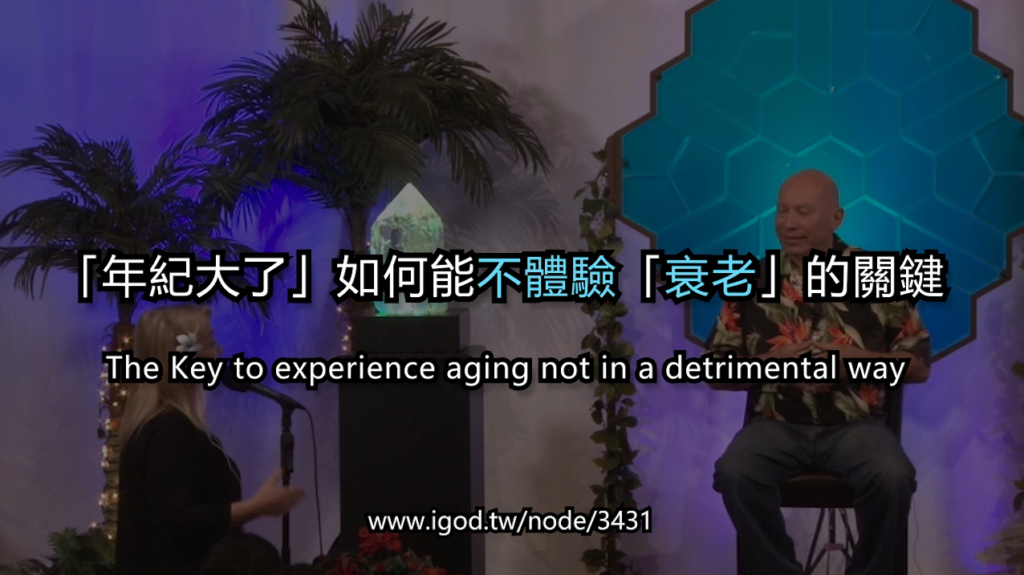
Q: So what happens when you’re getting older, you can’t remember anything?
Q: 這麼說的話,為什麼當你越來越年老,你就越來越記不住任何事情呢?
But it’s not because you’re getting older, it’s because your beliefs are not aligning with the idea of still being vital.
記不住事情並不是因為你越來越老,而是因為:你的「信念」並沒有與自己仍然「處於充滿生命力」的振頻調準對齊。
Q: So, the whole idea of aligning with the collective…
Q: 所以,這整個「與(社會)集體振頻結盟對齊」的概念…
One moment.
等一下。
Okay. What is a primary discussion that you all recognize seems to go hand-in-hand with the idea of someone aging in the detrimental way?
好。對於「你們似乎全都一致認為某人年歲增長(變老)是有害健康的」這集體觀念,什麼是你們主要討論的重點?
In many cases, it expresses itself as a lack of flexibility.
在許多情況下,這集體觀念表達著「年歲增長」本身,是一種缺乏靈活性和適應力。
Q: Right.
Q: 沒錯。
Yes?
對嗎?
Yes.
對。
So, it is the lack of flexibility that starts that process in the way that you’re defining it.
因此,正是因為「缺乏靈活性和適應力」,才開始產生「你們以那方式在定義它(認為年歲增長是衰老、有害健康)」的集體觀念。
Q: Okay.
Q:好的。
By allowing yourself to remain malleable and flexible, you don’t have to experience that as a sign of aging.
藉由讓自己(的身體和心智)保持靈活性和保有適應力和可塑性,你就不必體驗年歲增長為一種「衰老」的跡象。
Q: Okay. So, part of this is buying into the collective that when you age this is what happens.
Q:好的。所以說,覺得自己衰老的一部分原因是:深陷那集體信念,相信當你老的時候這(衰老的跡象)就是會發生的事。
Yes.
沒錯。
Q:But another part of this is that’s why we’re exploring brain plasticity right now, is the idea that as you and learning new things is like a really critical thing like constantly having your brain learn new things.
Q: 而跟這議題有關的另一部分是,這是「為何我們(人類)一直在探索大腦的可塑性」的原因,這個概念就像你學習新的東西一樣,是一種非常要緊的事,所以要不斷地讓你的大腦學習新事物。
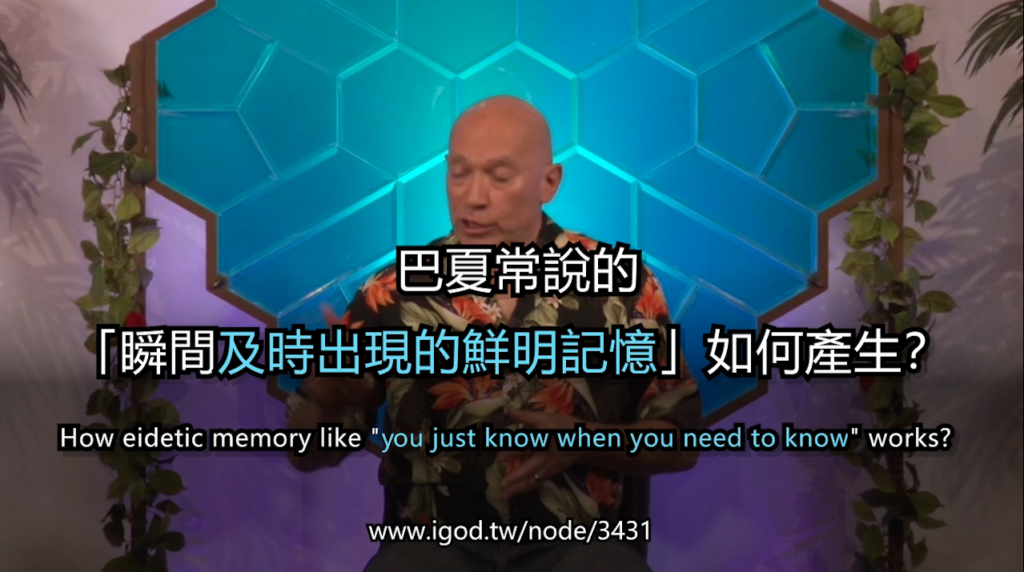
Yes, but let me add one thing. You see, everything exists here and now. That is the storage mechanism. Your brain doesn’t have to store anything, because the storage mechanism is inherent in the fabric of the “here and now”.
是的,但讓我加上一個觀點。 你知道,一切都存在於當下。那才是「儲存」機制(萬物如何存在和運作)的真相。你們的大腦不需要儲存任何東西,因為,「儲存機制」是「一切都存在於當下的結構中」固有的一部分。
It only needs to access. It doesn’t need to store. The storage is taken care of in the very matrix, in the very fabric of Existence Itself.
頭腦只需要去進入和取出(接收),不需要儲存。儲存是「萬物存在本身」的母體和基本結構中,已經與生具有的功能。
So, if you just have the vibration to access, you can access because the storage is already here.
因此,如果你只要(對齊調準自己的振頻,讓自己)保有「去進入和接收」的振頻,你就可以獲取(你需要的資訊),因為儲存機制早已存在。
Q: What you’re saying is you can relate to information in a new way that then allows you to know what you need to know when you need to know it.
Q: 你所說的是:你可以用新的方式去連結(你要獲取的)資訊,然後,那會讓你在「你需要知道的時間點」知道「你所需要知道的東西」。
Yes.
是的。
Q: So, it’s kind of that feeling of maybe channeling a little bit…
Q:所以,這種感覺可能有點像是在「通靈」…
Oh yes.
是的。
Q: where you’re trying to figure out something out, and suddenly just a word will come to you. Or like, for me, it might be the name of a tree, like all of the sudden, I know what that tree is.
Q: 當你在試圖想出某東西時,突然間,只是一個詞出現在你腦海裡。或像是,對我而言可能是一棵樹的名字,像是突然間,我就知道那棵樹的名字是什麼,
Exactly.
正是那樣。
Q: Even though I have no way that I know that tree. But I know it.
Q: 即使在這之前我無法知道「我知道那棵樹叫什麼」。但我就是(靈光乍現式地)知道它。
Exactly. Now, this ability exists in a lot of your children, and it is drawn out of them, because when a teacher finds a student in your society who just knows the answer, but they don’t know how they got it. They are called “cheaters”, and they never do it again.
正是如此。現在,這樣的能力存在於你們許多孩子的身上,但他們的這種能力卻被驅離他們身上,因為,在你們的社會中,當老師(或家長)發現學生知道答案但卻不知道「他們如何得到答案」時,他們會被稱為「作弊」者,而他們就從此(否定這種能力和行為)不再這樣做了。
So, it’s about going back to that natural ability of living in the moment, and just knowing what you need to know.
所以,重點是在:讓自己和孩子回到那「活在當下時的自然能力」,而你只是自然知道「你需要知道的」。
Q: Okay, so like photographic memory, or like…
Q: 好的,所以,像過目不忘的記憶力,或像…
No such thing in that sense. It’s what you call “eidetic”.
不是那樣的。而是你們所謂(瞬間出現)的「印象鮮明記憶」。
Q: Okay, so…
Q: 好,所以…
But that is what eidetic memory is, what I already described to you.
但這就是你們所謂「鮮明記憶」的東西,即我剛才所描述的東西(瞬間及時出現的鮮明記憶)。
The plasticity in malleability of the brain synapses to rearrange themselves immediately to such a degree on such a frequency level that the information is immediately at hand.
大腦(細胞突觸結合)的可塑性及延展性,在重新排列自己時能立即達到這樣的程度、這樣的振頻,使得(儲存於萬物存在中的)資訊能立即出現在腦海中。
That’s what it is. That’s what eidetic memory is. Extreme plasticity and rearrangement of the synapses of the brain to align to the frequency that gets that information.
那「活在當下時的自然能力」就是這樣運作的。「(瞬間及時出現的)鮮明記憶」這就是這樣產生的:藉由極度的可塑性以及大腦細胞的重新排列而能和「可獲取該資訊的頻率」相互對齊調準。
Q: And for example, if someone was taking a test, and then they’re trying to find the answer to a question, and then they can see the page in their mind in the textbook where it has that answer. That is a representation of being in the moment to such a degree that you’re able to channel the information from the universe basically? Or…
Q: 例如,某些人正在參加一項考試,他們正試圖找到試題中的答案,而他們可以從浮現在腦海中的教科書內容看到該問題的答案。這就是「如此程度地處在當下,基本上你就能夠通靈連結宇宙中的資訊」的代表例子嗎?或…
Yes.
沒錯。
Q: Or, it’s not from your memory though, it’s actually you are seeing the page at that moment.
Q: 或者說,它不是來自你的記憶,而是你實際地在那一刻能看見那教科書頁面的內容。
Because the page exists here and now with everything else, and the brain arranges itself on such a specific frequency that it can actually call out that bit of information from all the information in existence.
因為那教科書頁面和所有一切東西都存在於「當下」此時此地,而大腦按照這樣的一個特定頻率對齊調準自己的振頻,讓它能實際上發送出那一信息點的頻率,而從本已存在的信息場中讀取那些資訊。
Because that’s what you need. You’re so aligned and the brain will show it. Brain will show it. You can do the tests. You can see the brain rearranging itself in those moments.
因為那是你正需要(的資訊)的振頻。你的振頻(和那資訊的頻率)是如此協調一致,所以大腦會顯示出你正需要的資訊。資訊會出現你腦海裡(Google搜尋不也如此?下精準的關鍵字詞(振頻),才能收到精準的資訊。^_^)。你可以做這樣的測試,你可以看到大腦在那些時刻會(隨著你調整的振頻)重新排列自己的振頻。
Q: So when we were children, like obviously some children do better in school than others, and some of them…
Q: 因此,當我們還是孩子時,就像有些孩子在學校的表現比其他孩子好,而有些孩子…
Well, for a variety of reasons, of course.
嗯,當然,那會因為各種不同的原因。
Q: And some of the things that show up in children are their ability to regurgitate information, and so what it is that we need to teach our children about memory, and learning that will allow them to have a better relationship with memory?
Q: 而有些事情顯示出兒童們有反芻信息的能力,所以說,關於「記憶」,什麼是我們還需要教導孩子的地方?而學習這些教導,會讓他們建立一種與和記憶之間更好的關係?
Well, again, we have already given many suggestions for how the idea of teaching on your planet can changed to allow these things to be more nature, and has a lot to do with interactivity and experience in a safe way.
好,再次回答你這點,我們已經提出過許多建議,說明地球上的教學方式可以改變的重點,以讓這些事情(教學的過程)更加自然,其中有很多是和「互動性」和「以安全的方式去體驗」有關的教導,
Learning the consequences of choices, and allowing it to be “okay” to access information in whatever way they may naturally do so, and rewarding them for that, not punishing them for that. Yes?
以及學習「承擔自己所做的選擇的後果」,並允許他們可以用任何他們會自然用的方進入和取得(剛談的那「及時出現的鮮明記憶」)信息,並為此獎勵而不是懲罰他們。好嗎?
Q: Right, so it’s having… If you have a more open relationship with the idea of memory, you’ll pass that on to your children, you can play games with them that allow them to see what they’re able to do without the pressure of failure.
Q: 是的,所以那是擁有一種……如果你和「記憶」之間擁有一種更開放的關係,你會將這概念傳給你的孩子,你可以和他們一起玩遊戲,這樣他們就能看到他們能夠在沒有「失敗的壓力」下學習做事。
You have to stop defining memory as something that has to do with the past. There is nothing to do with the past. There is no such thing as the past. It’s an illusion. There is only an alternate “now”.
你必須停止定義「記憶與過去有關」。「記憶」與「過去」無關。並沒有所謂「過去」這樣的東西,它是一種幻覺。只有一個可供選擇的「當下」。
Okay.
好的。
